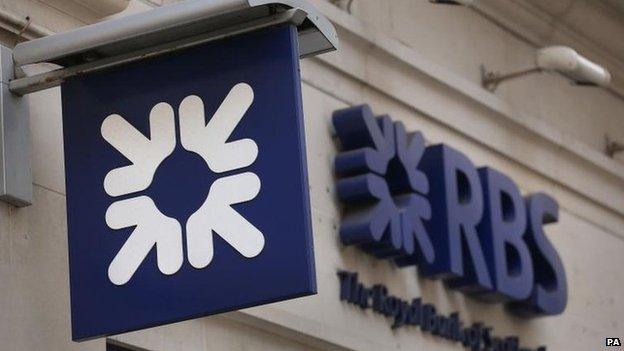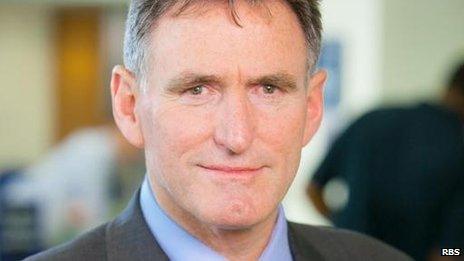RBS reserves £400m for currency probe
- Published

Royal Bank of Scotland has set aside £400m to cover potential costs from an investigation into alleged manipulation of the foreign exchange market.
The provision, revealed in its third quarter results, external, follows Barclays' decision to set aside £500m.
Pre-tax profit at RBS came in at £1.27bn - up £260m on the previous quarter and far better than the £634m loss in the same period last year.
RBS also said that it planned to retain Ulster Bank.
The bank's chief executive, Ross McEwan, said that Ulster remained a core part of the bank following a strategic review into its future.
He said early progress had been made towards his goal of making RBS simpler, clearer and fairer, adding: "But we know we still have a long list of conduct and litigation issues to deal with and much, much more to do to restore our customers' trust in us."
More branch closures were "inevitable", Mr McEwan said, but would not a figure on the number that could shut their doors.
RBS - which is 80%-owned by the government - said in June that 100 of its 1,900 branches had been earmarked for closure.
Lloyds said earlier this week that it would close as many as 200 branches of its network of 2,250 and cut 9,000 jobs.
Shares up
The £400m provision for the currency investigation sent the corporate and institutional banking division to an operating loss of £557m.
RBS is among several banks being investigated by regulators over allegations that currency markets were rigged.
The bank also set aside a further £100m to cover the cost of compensation for mis-sold payment protection insurance (PPI).
Investors welcomed the improving performance for the bank, sending shares up 6.21% by the London stock market close to 388p, their highest level since July 2011.
However, it warned: "Ongoing conduct and regulatory investigations and litigation continue to present challenges and are expected to be a material drag on both earnings and capital generation over the coming quarters.
"The timing and amounts of any further settlements or redress however remain uncertain and could be significant."
Richard Hunter, head of equities at Hargreaves Lansdown stockbrokers, said RBS has continued its positive momentum, but that a number of issues remained unresolved.
"In particular, the further provisions for PPI and Forex [foreign exchange] are symptomatic of the 'long list of conduct and litigation issues' which will continue to be costly, time-consuming and distracting.
"Along with a dividend payment, which is clearly some way off and the government share stake (and therefore influence), the journey back to full recovery is likely to remain arduous."

Mr McEwan said more branch closures were inevitable
RBS's overall position improved slightly in the three months to September 30, with its core tier 1 ratio - a key measure of financial health - up 0.7 percentage points to 10.8% in the quarter. It aims to raise the figure to 12% by the end of 2016.
Mr McEwan said there was "no way" the bank would consider paying a dividend to shareholders once more until it was well ahead of the 12% figure.
The bank also said that it had released £801m of money set aside for bad debts - known as impairment provisions - in the quarter compared with a figure of £93m in the second quarter of 2014. That was considerably better than the £590m analysts had expected and reflected an improving economic picture in both the UK and Ireland.
Total income fell 11% to almost £4.36bn, while operating expenses rose 5% to £3.88bn. Restructuring costs were down £205m to £180m compared with the previous quarter.
Loans and advances to customers were up 2%, or £7.4bn, to £393bn, and customer deposits increased by £4.1bn, or 1%, to £405.4bn.